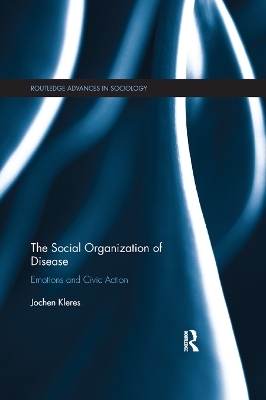
The Social Organization of Disease
Routledge (Verlag)
978-0-367-87300-4 (ISBN)
Empirically, this book is a case-study analysis of dissolution processes in German AIDS organizations. Indeed, why is it that civic organizers start out with a commitment to a cause but end up dissolving their organization? This question is exactly what Kleres seeks to tackle within The Social Organization of Disease.
Focusing on the emotional bases of dissolved German AIDS organizations to develop a typology of civic action and organizing, Kleres presents a perspective on non-profit organizations that analyses organizational development through the emotional sense making of individual organizers, within the light of larger political processes and cultural contexts. To this end, this volume develops and applies a new methodology for researching emotions empirically, expanding the scope of narrative analysis. However, parallel to this, The Social Organization of Disease also explores how shifting discursive processes establish emotional climates and thus impact on state policies and the evolution of AIDS organizing.
The book would appeal to sociologists and political scientists working in the field of social movements and non-profit organisations: but it would also appeal to those who are interested in the sociology of emotions. It would potentially be of interest to non-profit scholars who consider community-based organizations, volunteerism and advocacy, and secondarily, to medical sociologists interested in AIDS service organizations. Sociology, International relations, Social Work, Political Science. May be of interest for NGO-activists and/or employees and leadership.
Jochen Kleres is a postdoctoral researcher at the Gothenburg Centre of Globalization and Development, at the University of Gothenburg, Sweden.
Introduction
Conceptual Problems
Theoretical Problems
Theories of Volunteerism
Advances: Theories of Social Movements
Conceptual Problems Revisited: Empowering Distinctions
A Framework
Structure of the Book: On Studying Disbanded AIDS Organizations
References
Towards a Political Sociology of AIDS Service Organizations
A First Premise: The Social Construction of AIDS
The (Non-)Emergence of AIDS Organizations
A Second Premise: The Evolution of Public Health
Queer Corporatism
Professionalization and its Discontents
Power in the Field: The Field of AIDS Organizing
AIDS Service Organizations as Political and Discursive Agents
Conclusion: AIDS Service Organizations as a Form of Power
References
AIDS Organizations in Germany
Parallels: A Brief Note on the AIDS Discourse in Germany
The Role of Identity: The Emergence of AIDS Relief Organizations
The Power of Discourse: The Evolution of AIDS Policies in Germany
The Stakes of AIDS Organizing and of its Political Inclusion
The Evolution and Transformation of AIDS Relief
The Normalization of AIDS
Differences – The German Case in Contrast
Conclusion
References
Making Sense of Neo-Corporatism and Neo-Institutionalism
Neo-Corporatism – Principle Considerations
The Rationalist Premises of Neo-Corporatism
Neo-Institutionalism
Key Assumptions of Neo-Institutionalism
Neo-Institutionalism and Social Change
The Sensemaking Approach
Sensemaking: The Process of Organizing
Seven Characteristics and Some Sources of Sensemaking
Conclusion
References
Sensemaking, Narrative Analysis, and Emotions
Narrative Methodology and Analysis
Convergences: Sen
| Erscheinungsdatum | 16.12.2019 |
|---|---|
| Reihe/Serie | Routledge Advances in Sociology |
| Verlagsort | London |
| Sprache | englisch |
| Maße | 156 x 234 mm |
| Gewicht | 453 g |
| Themenwelt | Studium ► 1. Studienabschnitt (Vorklinik) ► Med. Psychologie / Soziologie |
| ISBN-10 | 0-367-87300-1 / 0367873001 |
| ISBN-13 | 978-0-367-87300-4 / 9780367873004 |
| Zustand | Neuware |
| Informationen gemäß Produktsicherheitsverordnung (GPSR) | |
| Haben Sie eine Frage zum Produkt? |
aus dem Bereich


